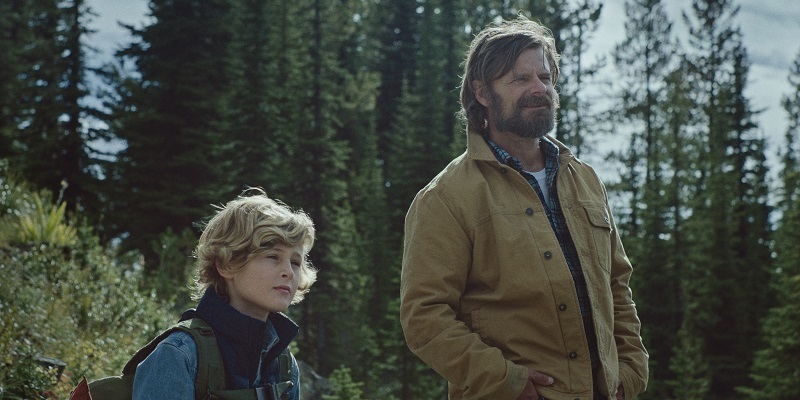
Review by
Benjamin Poole
Directed by: Anna Kerrigan
Starring: Steve Zahn, Jillian Bell, Sasha Knight, Ann Dowd

What a pleasant, welcome and low-key thought-provoking hour and change
afternoon watch Anna Kerrigan’s Cowboys is. As a
domestic drama lovingly painted within frontiersman wide-frames, and with
its deliberately old fashioned milieu (the sequences of small-town Idaho
could have been shot at any time in the last half century it would seem)
offering centre stage to a contemporary cultural issue, the film is a
winning combination of seemingly incongruous styles and ideas,
aesthetically fitting for a storyline which features the disaffection and
estrangement of a transgender boy.

Promising young actor Sasha Knight plays Joe, a boy born as a girl
who starts to dress and behave in ways in which he feels more comfortable.
His mom has issues with Joe’s transitioning, while Joe’s dad is accepting
and supportive. Problem is though that dad Troy (played by
Steve Zahn, who is as watchable as ever, like a big kid) is a
massive flake. Loving, but immature, boozy and unemployable, as much as
Joe hero worships his old man, Troy is his own brand of trouble. Like,
when some dipshit kid mocks Joe for his choice of shoes in a store, and
Troy ends up threatening the bully, punching the bully’s dad down some
stairs (I laughed) and then having to go to jail for a short stretch
(oops). The harshness of Northern American working-class life is grounded
by such candid plot verisimilitude; how many films have you seen where a
scuffle is just glossed over and doesn’t lead to custody?

No wonder then, that Troy refuses to accept his given, limited
circumstances. Instead of sorting his life out and strategizing a future
for his family, Troy takes the easier route and pins his hopes on a
juvenile conception of the American Dream, and attendant Western
archetypes learned from pop culture. He is a cowboy with no cows, a
gunslinger whose saloon has turned into a Bowlarama, and what’s more,
looking for a viable masculine role model, Joe fashions himself after his
hapless dad.
What is satisfying about Cowboys is the understanding
afforded to Jillian Bell’s Sally. As Joe’s mother she has
reservations about (who she sees as) her daughter transitioning;
hesitations which the film never portrays as transphobia, more a
difficulty in adjusting to huge change due to Sally’s ingrained
conservatism, and, also, a protective reluctance for her kid to fully
transition (any parent would want their child to be happy but would also
wish to spare them the potential social censor and physical discomforts
that trans people unfairly encounter in this setting, I would imagine).
What is also refreshing is the untidy nature of Jillian and Troy’s
relationship: there is still affection and attraction between the two,
which further complicates Joe’s situation.

So, when Troy absconds with Joe to fulfil some cockamamie idea about
escaping ‘across the border’ to Canada which, along the way, entails
living the life of a Gene Autry lyric beneath the stars in the great
outdoors, our sympathies are challenged. Kerrigan and
John Wakayama Carey’s photography in these scenes is so pretty it
is almost too much! You can see, from a superficial p.o.v., why the cedars
and flushing waters of the Canadian border are so appealing. Not so much
when Troy loses his medication rescuing Joe from a river and when guns,
that inevitable icon of the western, get involved. The sudden and
heightened drama of the film’s final act I’m slightly torn on, but the
climax is certainly true to Cowboys' consequential morality, which depicts a world of rule and rigidity
wherein romantic flight becomes a viable option.

Cowboys is on UK/ROI Digital and Curzon Home Cinema from May 7th.

